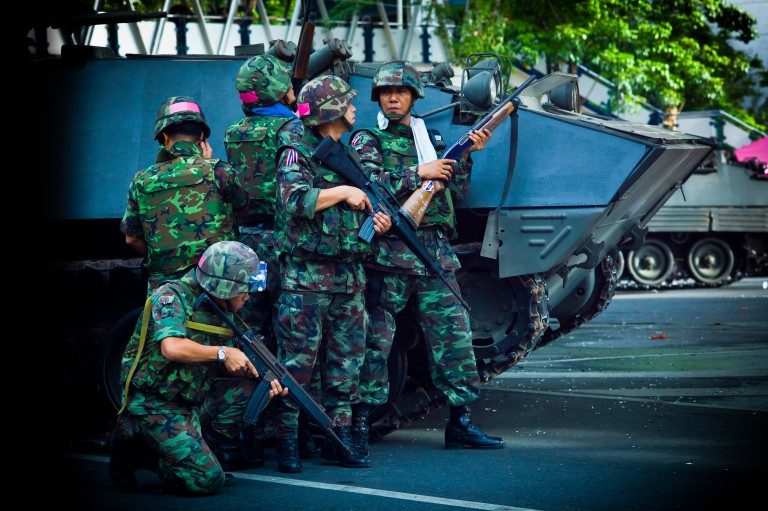Many have promised to bring Thailand together, but only succeeded in uniting people against them. The increasingly-isolated Thai junta could soon get the measure of their own popularity, Paul Sanderson writes.
Uniting the country is so often the catch-cry of those who would do anything but. In Thailand, a succession of prime ministers both elected and not have pledged to bring the country together as more than a decade of bitter division has seethed and occasionally flared into violence.
Former Prime Minister Yingluck Shinawatra’s administration gave probably the most obvious example of this when their ill-advised attempt to introduce a bill at 3am giving a sweeping amnesty to the country’s greatest political troublemakers, including her fugitive brother, only succeeded in uniting the country against them. Many of those aligned ideologically with the ruling party, and even several government MPs, joined the chorus of condemnation.
History, as is its wont, is in danger of repeating itself. The military regime, known officially as the National Council for Peace and Order, will mark its second anniversary on May 22. It has held power almost as long as Yingluck had before the Pheu Thai party’s tactical blunder.
The junta is embarking on a referendum as it finds itself increasingly isolated: Fewer and fewer voices speak out in support of Prayut Chan-o-cha’s regime and the draft charter it almost dictated to chief constitution writer Meechai Ruchupan.
Even those who were anti-Yingluck in 2013 have condemned the NCPO’s transparent plan to cling on to power for a further five years after the slated 2017 election, should it go ahead. Former PM Abhisit Vejjajiva, who was on the streets for some of the Bangkok Shutdown protests, spoke out against the draft constitution, saying it “distorts” democracy and “weakens people’s power”.
The regime is not quite at the point of uniting the country against it, but the August 7 referendum and the crackdown on dissent will seriously test its support.
The Election Commission has expressed confidence of a turnout of 80 per cent, telling Reuters about 51 million people were eligible to cast a vote. This would be significantly higher than the 57 per cent who turned out for the comparable 2007 referendum on a military-led charter, although commissioner Somchai Srisuthiyakorn would not say why. (Somchai, it is worth noting, is a controversial figure himself.)
It would also be a higher turnout than most general elections of the past 20 years, which have hovered between 60 and 70 per cent – the outliers being the 2007 post-coup poll when 85 per cent went to the polls as the ousted Thaksin Shinawatra and his opponents rallied support, and the 2014 pre-coup ballot, when about 47 per cent of eligible voters showed up amid protests, cancellations and after a shooting designed to scare people away.
The suggestion that 40 million people could vote on August 7 may be based on optimistic interpretations of polling. A Suan Dusit poll in mid-April found 85 per cent of respondents thought the constitution was important to the country’s future. But they may as well have asked whether they thought the record-breaking summer was hot: of course it’s important.
A closer look at the results, from a polling agency that has produced headlines favourable to the regime, reveals two-thirds were not impressed by the draft constitution. Curiously, 73 per cent said they might have “other things to do” on the day of the election. More than half said politics served only vested interests and thought the referendum was a waste of money.
The Election Commission made another public foray at the end of April, issuing a list of dos and don’ts for those keen on campaigning. The don’ts are problematic, with activists and political figures questioning the vagueness of phrases such as “false information”, “incite the public politically” and “incites unrest”.
The commission’s guide came after the junta, more worryingly, declared that expressing too strong an opinion in the lead-up to the referendum could bring about a 10-year jail term. Other penalties include a potential 10-year ban from politics and hefty fines. There have already been arrests.
This being a country where smiles are shallow and cynicism runs deep, there is always another theory or three. One goes that the referendum is being set up to fail: Gen Prayut’s terse replies when pressed on what would happen in that event suggest there is a contingency plan they want to keep guarded. Another goes that the smattering of protests will be used to justify calling the referendum off altogether: the roadmap to elections has already been pushed out two years and the military sank its first draft, so there is precedent. Other speculation quickly turns into sad stories of the death of kings.
There is a mindset that the military wasted the 2006 coup and returned the country to democracy too quickly. No chances are being taken this time. This is not a new observation, but with the referendum coming into focus it is worth asking just how long the status quo will be tolerated.
Chulalongkorn University’s Thitinan Pongsudhirak raised all these points in April, with a forecast of long-term military rule and a road ahead that will “most likely be marked by more turmoil”.
The junta is determined to be around in some capacity until at least 2022. The referendum is not likely to alter its grand plans, but it will provide some indication of how much of the country is united behind them, and how much against.
Paul Sanderson is a pen name. The author is an independent writer and consultant based in and around Southeast Asia.
This article is published as a collaboration between New Mandala and Policy Forum, Asia and the Pacific’s platform for analysis and discussion on public policy.
 Facebook
Facebook  Twitter
Twitter  Soundcloud
Soundcloud  Youtube
Youtube  Rss
Rss 